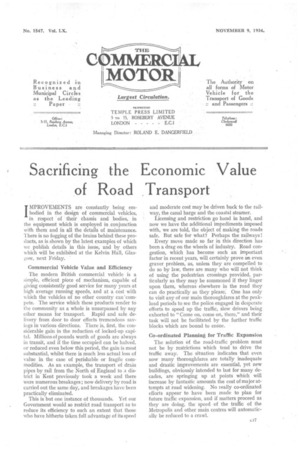Sacrificing the Economic Value of Road Transport
Page 47

If you've noticed an error in this article please click here to report it so we can fix it.
MPROVEMENTS are constantly being em bodied in the design of commercial vehicles, in respect of their chassis and bodies, in the equipment which is employed in conjunction with them and in all the details of maintenance. There is no fogging of the brains behind these products, as is shown by the latest examples of which we publish details in this issue, and by others which will be exhibited at the Kelvin Hall, Glasgow, next Friday.
Commercial Vehicle Value and Efficiency The modern British commercial vehicle is a simple, efficient piece of mechanism, capable of giving consistently good service for many years at high average running speeds, and at a cost with which the vehicles of no other country can -compete. The service which these products render to the community as a whole is unsurpassed by any other means for transport. Rapid and safe delivery from door to door effects tremendous savings in various directions. There is, first, the considerable gain in the reduction of locked-up capital. Millions of pounds worth of goods are always in transit, and if the time occupied can be halved, or reduced even below this period, the gain is most substantial, whilst there is much less actual loss of value in the case of perishable or fragile commodities. As an example, the transport of drain pipes by rail from the North of England to a district in Kent previously took a week and there were numerous breakages; now delivery by road is carried out the same day, and breakages have been practically eliminated.
This is but one instance of thousands. Yet our Government would so restrict road transport as to reduce its efficiency to such an extent that those who have hitherto taken full advantage of its speed and moderate cost may be driven back to the railway, the canal barge and the coastal steamer.
Licensing and restriction go hand in hand, and now we have the additional impediments imposed with, we are told, the object of making the roads safe. But safe for what? Perhaps the railways !
Every move made so far in this direction has been a drag on the wheels of industry. Road congestion, which has become such an important factor in recent years, will certainly prove au even graver problem, as, unless they are compelled to do so by law, there are many who will not think of using the pedestrian crossings provided, particularly as they may be summoned if they linger upon them, whereas elsewhere in the road they can do practically as they please: One has only to visit any of our main thoroughfares at the peakload periods to see the police engaged in desperate efforts to speed up the traffic, slow drivers being exhorted to "Come on, come on, there," and their task will not be facilitated by the further traffic blocks which are bound to ensue.
Co-ordinated Planning for Traffic Expansion The solution of the road-traffic problem must not be by restrictions which tend to drive the traffic away. The situation indicates that even now many thoroughfares are totally inadequate and drastic improvements are essential, yet new buildings, obviously intended to last for many decades, are springing up at points which will increase by fantastic amounts the cost of major attempts at road widening. No really co-ordinated efforts appear to have been made to plan for future traffic expansion, and if matters proceed as they are doing, the speed of the traffic of the Metropolis and other main centres will automatically be reduced to a crawl.
























































































































